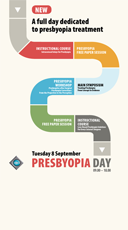Safety and efficacy of a 4th generation implantable collamer lens for the correction on myopia and myopic astigmatism
(results will display both Free Papers & Poster)
Session Details
Session Title: Phakic IOLs II
Session Date/Time: Tuesday 08/09/2015 | 14:00-16:00
Paper Time: 14:12
Venue: Room 17
First Author: : S.Taneri GERMANY
Co Author(s): : S. Oehler H. Dick
Abstract Details
Purpose:
Some patients with moderate to high myopia may be eligible for implantation of a phakic intraocular lens for vision correction. The 4th generation of the implantable collamer lens (Visian ICL, Staar Surgical, Monrovia, California, USA) is characterized by three holes that allow for aequeous humor passage and may thus obviate the need of peripheral iridectomies. We wanted to present our first experiences with this new lens generation.
Setting:
Zentrum für Refraktive Chirurgie, Augenabteilung am St. Franziskus Hospital, Münster, Germany
Methods:
Analysis of 44 eyes of adult patients with stable myopia or myopic astigmatism up to -16.25 dpt sphere and up to -4.75 dpt cylinder, who were not eligible for full correction with an excimer laser. Spheric and toric ICLs were implanted. Exclusion criteria: Anterior chamber depth less than 2.8mm (measured excluding corneal thickness), insufficient endothelial cell density, other pre-existing ocular conditions, and prior eye surgery. Postop treatment included antibiotic eye-drops for 5 days and anti-inflammatory eye-drops for 4 weeks.
Results:
Three eyes developed ocular hypertension 2 to 3 hours after surgery, which could be addressed by increased oral acetazolamide on the operative day. Mean corrected distance visual acuity preoperatively was 0.98. Mean postoperative uncorrected distance visual acuity was 0.78 (min 0.1, max 1.25) / 0.92 (min 0.20, max 1.25) / 0.94 (min 0.50, max 1.60) / 0.95 (min 0.8, max 1.25) at 1 day / 1 week / 3 months / 1 year, respectively. No complication occurred during implantation. No eye lost more than 2 lines of best corrected visual acuity. Induction of cataract or glaucoma was not observed.
Conclusions:
Preliminary results indicate a quick recovery of distance visual acuity within the first days and a stable refraction over time. The new design seems to obviate the need of peripheral iridectomies. Longer follow-up is warranted.
Financial Interest:
NONE





